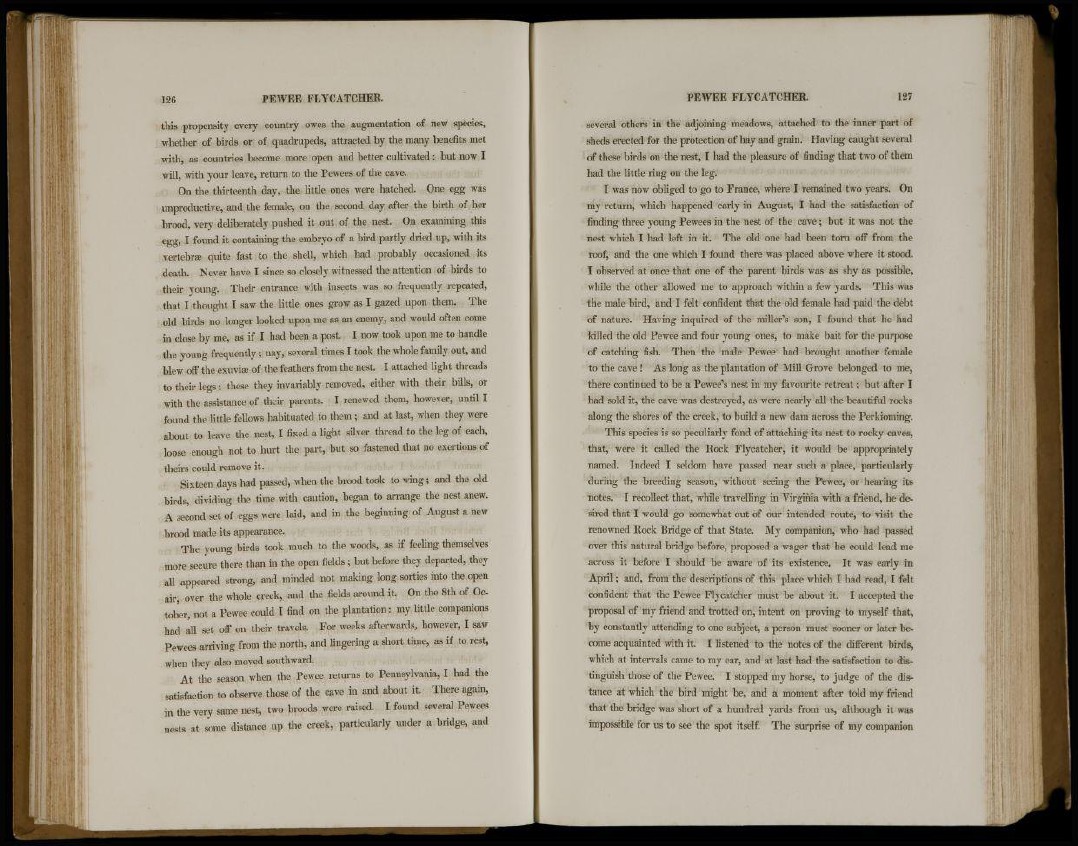
this propensity every country owes the augmentation of new species,
whether of birds or of quadrupeds, attracted by the many benefits met
with, as countries become more open and better cultivated: but now I
will, with your leave, return to the Pewees of the cave.
On the thirteenth day, the little ones were hatched. One egg was
unproductive, and the female, on the second day after the birth of her
brood, very deliberately pushed it out of the nest. On examining this
egg, I found it containing the embryo of a bird partly dried up, with its
vertebras quite fast to the shell, which had probably occasioned its
death. Never have I since so closely witnessed the attention of birds to
their young. Their entrance with insects was so frequently repeated,
that I thought I saw the little ones grow as I gazed upon them. The
old birds no longer looked upon me as an enemy, and would often come
in close by me, as if I had been a post. I now took upon me to handle
the young frequently; nay, several times I took the whole family out, and
blew off the exuviae of the feathers from the nest. I attached light threads
to their legs: these they invariably removed, either with their bills, or
with the assistance of their parents. I renewed them, however, until I
found the little fellows habituated to them ; and at last, when they were
about to leave the nest, I fixed a light silver thread to the leg of each,
loose enough not to hurt the part, but so fastened that no exertions of
theirs could remove it.
Sixteen days had passed, when the brood took to wing; and the old
birds, dividing the time with caution, began to arrange the nest anew.
A second set of eggs were laid, and in the beginning of August a new
brood made its appearance.
The young birds took much to the woods, as if feeling themselves
more secure there than in the open fields ; but before they departed, they
all appeared strong, and minded not making long sorties into the open
air, over the whole creek, and the fields around it. On the 8th of October,
not a Pewee could I find on the plantation: my little companions
had all set off on their travels. For weeks afterwards, however, I saw
Pewees arriving from the north, and lingering a short time, as if to rest,
when they also moved southward.
At the season when the Pewee returns to Pennsylvania, I had the
satisfaction to observe those of the cave in and about it. There again,
in the very same nest, two broods were raised. I found several Pewees
nests at some distance up the creek, particularly under a bridge, and
several others in the adjoining meadows, attached to the inner part of
sheds erected for the protection of hay and grain. Having caught several
of these birds on the nest, I had the pleasure of finding that two of them
had the little ring on the leg.
I was now obliged to go to France, where I remained two years. On
my return, which happened early in August, I had the satisfaction of
finding three young Pewees in the nest of the cave; but it was not the
nest which I had left in it. The old one had been torn off from the
roof, and the one which I found there was placed above where it stood.
I observed at once that one of the parent birds was as shy as possible,
while the other allowed me to approach within a few yards. This was
the male bird, and I felt confident that the old female had paid the debt
of nature. Having inquired of the miller's son, I found that he had
killed the old Pewee and four young ones, to make bait for the purpose
of catching fish. Then the male Pewee had brought another female
to the cave ! As long as the plantation of Mill Grove belonged to me,
there continued to be a Pewee's nest in my favourite retreat; but after I
had sold it, the cave was destroyed, as were nearly all the beautiful rocks
along the shores of the creek, to build a new dam across the Perkioming.
This species is so peculiarly fond of attaching its nest to rocky caves,
that, were it called the Rock Flycatcher, it would be appropriately
named. Indeed I seldom have passed near such a place, particularly
during the breeding season, without seeing the Pewee, or hearing its
notes. I recollect that, while travelling in Virginia with a friend, he desired
that I would go somewhat out of our intended route, to visit the
renowned Rock Bridge of that State. My companion, who had passed
over this natural bridge before, proposed a wager that he could lead me
across it before I should be aware of its existence. It was early in
April; and, from the descriptions of this place which I had read, I felt
confident that the Pewee Flycatcher must be about it. I accepted the
proposal of my friend and trotted on, intent on proving to myself that,
by constantly attending to one subject, a person must sooner or later become
acquainted with it. I listened to the notes of the different birds,
which at intervals came to my ear, and at last had the satisfaction to distinguish
those of the Pewee. I stopped my horse, to judge of the distance
at which the bird might be, and a moment after told my friend
that the bridge was short of a hundred yards from us, although it was
impossible for us to see the spot itself. The surprise of my companion